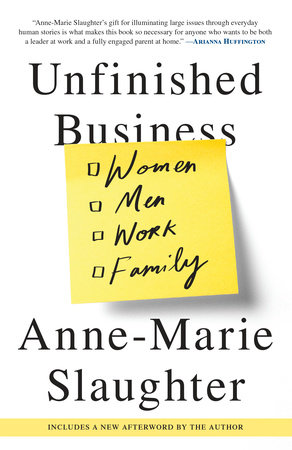Unfinished Business
Women Men Work Family
Anne-Marie Slaughter
Paperback
Bestseller
August 9, 2016 | ISBN 9780812984972
AmazonBarnes & NobleBooks A MillionBookshop.orgHudson BooksellersPowell'sTargetWalmart
Audiobook Download
September 29, 2015 | ISBN 9780385367912
Ebook
September 29, 2015 | ISBN 9780812994575
AmazonApple BooksBarnes & NobleBooks A MillionGoogle Play StoreKobo
About the Book
NAMED ONE OF THE BEST BOOKS OF THE YEAR BY THE WASHINGTON POST, NPR, AND THE ECONOMIST
When Anne-Marie Slaughter accepted her dream job as the first female director of policy planning at the U.S. State Department in 2009, she was confident she could juggle the demands of her position in Washington, D.C., with the responsibilities of her family life in suburban New Jersey. Her husband and two young sons encouraged her to pursue the job; she had a tremendously supportive boss, Secretary of State Hillary Clinton; and she had been moving up on a high-profile career track since law school. But then life intervened. Parenting needs caused her to make a decision to leave the State Department and return to an academic career that gave her more time for her family.
The reactions to her choice to leave Washington because of her kids led her to question the feminist narrative she grew up with. Her subsequent article for The Atlantic, “Why Women Still Can’t Have It All,” created a firestorm, sparked intense national debate, and became one of the most-read pieces in the magazine’s history.
Since that time, Anne-Marie Slaughter has pushed forward, breaking free of her long-standing assumptions about work, life, and family. Though many solutions have been proposed for how women can continue to break the glass ceiling or rise above the “motherhood penalty,” women at the top and the bottom of the income scale are further and further apart.
Now, in her refreshing and forthright voice, Anne-Marie Slaughter returns with her vision for what true equality between men and women really means, and how we can get there. She uncovers the missing piece of the puzzle, presenting a new focus that can reunite the women’s movement and provide a common banner under which both men and women can advance and thrive.
With moving personal stories, individual action plans, and a broad outline for change, Anne-Marie Slaughter reveals a future in which all of us can finally finish the business of equality for women and men, work and family.
“I’m confident that you will be left with Anne-Marie’s hope and optimism that we can change our points of view and policies so that both men and women can fully participate in their families and use their full talents on the job.”—Hillary Rodham Clinton




